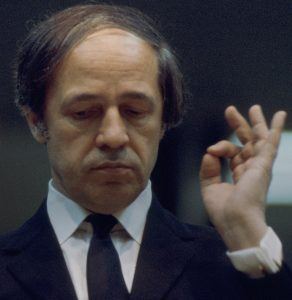Roger Mathew Grant in Aeon:
 Can a melody provide us with pleasure? Plato certainly thought so, as do many today. But it’s incredibly difficult to discern just how this comes to pass. Is it something about the flow and shape of a tune that encourages you to predict its direction and follow along? Or is it that the lyrics of a certain song describe a scene that reminds you of a joyful time? Perhaps the melody is so familiar that you’ve simply come to identify with it.
Can a melody provide us with pleasure? Plato certainly thought so, as do many today. But it’s incredibly difficult to discern just how this comes to pass. Is it something about the flow and shape of a tune that encourages you to predict its direction and follow along? Or is it that the lyrics of a certain song describe a scene that reminds you of a joyful time? Perhaps the melody is so familiar that you’ve simply come to identify with it.
Critics have proposed variations on all of these ideas as explanatory mechanisms for musical pleasure, though there remains no critical consensus. The story of their attempts and difficulties forms one vital component of Western intellectual history, and its many misdirections are revealing to trace in their own right. In early modern Europe, theorists generally adopted a view inspired by Aristotle’s Poetics: they supposed that the tones of a melody could work together with a text in order to imitate the natural world. Music, in this view, was something of a live soundtrack to a multimedia representation. It could assist in an analogic way with the depiction of the natural sentiments or features of the world captured in the language of its poetry, thereby eliciting a pleasurable response. Determining specifically how this worked was, in fact, the elusive goal set out at the opening of René Descartes’s first complete treatise, the Compendium Musicae (written in 1618). Unfortunately, Descartes never made it past a simple elaboration of musical preliminaries. He felt that, in order to make the connection to pleasure and passion, he would need a more detailed account of the movements of the soul.
More here. [Thanks to Seema Dhody Natesan.]
